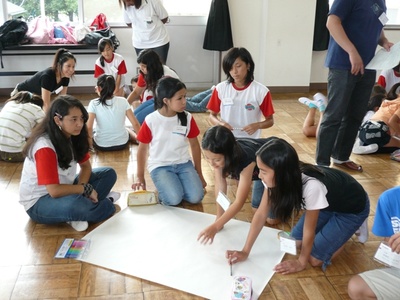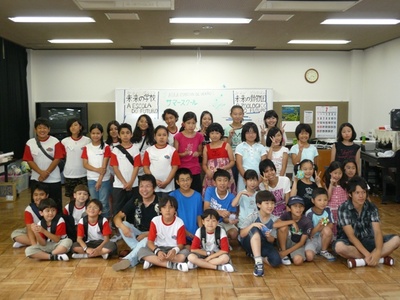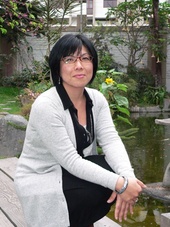La Universidad de Utsunomiya, en Tochigi, Japón, inició en 2004 una investigación sobre la situación de los niños extranjeros en dicha prefectura, con gran presencia de migrantes. A este estudio se sumó en 2006 la Dra. Ana Sueyoshi*, que ha seguido de cerca el difícil proceso de inserción de los niños peruanos. Conversamos con ella durante su visita a Lima en setiembre de 2009.
La profesora Ana Sueyoshi brindó una conferencia en el Centro Cultural Peruano Japonés, organizada por el Departamento de Idioma de la Asociación Peruano Japonesa, sobre los resultados de una encuesta realizada el 2008 respecto de los niños que regresaron al Perú luego de haber vivido en Japón.
¿Cuáles son los objetivos del proyecto?
El proyecto nace el 2004 en la Facultad de Estudios Internacionales – Departamento de Ciencias Sociales de la Universidad de Utsunomiya, en Tochigi, Japón, y tenía por objetivo hacer una especie de estudio exploratorio sobre el ambiente de los niños extranjeros en esta prefectura, por lo que se empezó a visitar los colegios para saber cuántos niños extranjeros había, en qué condiciones estaban, si realmente se adaptaban al sistema educativo japonés, si el rendimiento era bueno o no, qué nivel de japonés tenían.
En el segundo año se decidió hacer una encuesta a niños y a padres de familia de los colegios que albergan a niños extranjeros, y los resultados que se obtuvieron fueron, en líneas generales, que el niño extranjero no puede tener un buen rendimiento escolar cuando no tiene un buen manejo del idioma japonés. Tan simple y sencillo como eso.
¿Cómo califica el nivel de japonés de los niños peruanos?
El problema existe cuando los niños brasileños y peruanos no dominan el idioma japonés. Cuando lo dominan, creo que no hay problema, pero ahí viene otro problema más, que es la falta de identidad de ese niño.
El niño no es japonés y lo sabe, pero no entiende por qué no es japonés si nació en Japón y vive en Japón y no sabe nada de Perú, y además le dicen ‘tú eres peruano’. Esos problemas salen después. El niño pierde mucha seguridad.
Los estudiantes que tenemos en la universidad, por ejemplo, son casos exitosos porque están en la universidad, aunque no hablan español. La gente cree que los niños pueden ser bilingües, lo cual es una mentira; manejan bien un idioma y el otro completamente desigual, lo hablan, pero nunca desde un punto de vista académico satisfactorio, y lo que más nos llama la atención y queremos que no haya más casos como ése, es ser semilingüe, es decir, no hablar bien ningún idioma.
¿Existe presión de los padres sobre el niño respecto del aprendizaje del japonés?
Pienso que la comunidad nikkei siempre se ha caracterizado por ser una comunidad pujante, que busca ascenso social, ascenso económico, y para lograr eso siempre ha apuntado a tener una buena educación.
La idea que tengo es que la gente por lo general no cambia de valores. Bajo esa misma perspectiva muchos de los padres que migraron a Japón en los 90’s lo hicieron porque no podían pagar los colegios y la universidad de los hijos; es como que lo más importante de nuestra vida familiar es la educación de los hijos y viajo al Japón para poder pagarlo.
Pero pienso que en el intermedio del viaje, al estar mucho tiempo en Japón, al ser un grupo marginado en la sociedad japonesa, ya las personas, como grupo social, cambian de valores. Es una hipótesis, no me atrevo a afirmarlo. Yo creo que hay un cambio de valores en los nikkei peruanos que están ahora en Japón, en el sentido de que el valor que le dan a la educación de los hijos ya no es tanto como el valor que todos nosotros tenemos en mente como parte de esta comunidad nikkei.
Yo creo que para muchos de los nikkei que están en Japón lo más importante es la parte económica. Cuando yo conversaba con algunos nikkei me decían ‘qué se va a hacer, mi hijo se tendrá que sacrificar’. ¡Mi hijo se tendrá que sacrificar! Mi respuesta es ‘tú estás sacrificando a tu hijo, tu hijo no puede tomar una decisión’.
Usted mencionaba como casos de éxito a chicos que ya se han adaptado y hablan muy bien el japonés. ¿Ellos ya no se sienten peruanos en absoluto?
No se sienten peruanos.
¿Y a pesar de ello son casos de éxito?
Sí, situándonos en el sentido académico, porque nosotros buscamos la ubicación social de esos chicos, no queremos que sigan siendo marginados, ni por ellos mismos ni por el resto.
Yo digo exitosos porque por ejemplo en nuestra universidad, que es pública, el 95% de los estudiantes tienen trabajo al siguiente año de haber egresado. Si a eso le llamamos participar exitosamente en el sistema japonés, yo creo que ellos van a lograrlo. Sin embargo esos chicos no hablan español.
Creo que hay una crisis de identidad pero –de repente es muy malo lo que voy a decir– yo no estoy tan preocupada por ello, que es un problema, que va surgir luego, pero por lo menos, yo creo que todos los chicos peruanos que por decisión de los padres están en Japón, tienen que tener una oportunidad para sentir que pueden ganar un sueldo decente en una sociedad, y luego la identidad me imagino que vendrá después, ya de adultos la buscarán, pero por lo menos ese es mi objetivo.
El proyecto, como objetivo general, va más allá. Se busca que los estudiantes no pierdan la identidad de su país, que el niño esté orgulloso de ese pasado que trae consigo. Lo que se quiere es integrar a la sociedad japonesa al niño que viene con una multiculturalidad que sería buena para la sociedad japonesa. Viéndolo de manera más concreta, esos niños vienen sabiendo un poco de español, hablándolo, escribiéndolo, mal de repente, pero ya con algo de español, entonces como recurso humano es valioso, esa es la visión que tiene el proyecto, aprovechar ese recurso humano, integrarlo bien a la sociedad japonesa, hacerlo útil y, obviamente, que el niño se desarrolle dentro de sus capacidades.
¿En qué edades se ve más problemas?
Yo diría que es muy problemático cuando uno mueve de un continente a otro cuando el niño tiene 12 ó 13 años. A esa edad moverlo de un lenguaje a otro es una cosa muy seria, además es una edad que tiene muchas inseguridades, que necesitan amigos. Es en ese grupo que he identificado rechazo hacia los padres. Me dicen ‘¿por qué me mueven?, ya estoy harto de que me muevan, les he dicho a mis padres que me dejen en cualquier sitio, pero que me dejen’. Este grupo es el más afectado.
¿Cuántos estudiantes latinoamericanos llegan a la universidad?
El porcentaje en la prefectura es muy bajo. El sistema japonés es muy diferente al sistema educativo peruano, la primaria y la secundaria básica son muy fáciles, no existe repetición de curso ni de año. Llegar al Chuugakkoo, donde tiene que dar el primer examen, ya es un primer escollo, pero el Koukou es determinante, porque ahí el examen sí es muy difícil. Ahí es donde viene la hora de la verdad.
Los padres peruanos tienen que enterarse de que el sistema educativo japonés es muy diferente al peruano, y si no ponen el ojo permanente en la educación de sus hijos, no van a tener casos exitosos: que el niño egrese, pase a la secundaria superior y que luego termine y que vaya a la universidad. Si ellos no ponen atención a la educación de sus niños van a tener un ciclo vicioso, de niños trabajando en fábricas nuevamente, no superándose ni académica ni profesionalmente.
¿Qué resultados arroja la encuesta que realizaron?
Casuísticamente hay diferentes patrones que se pueden observar. En casos exitosos, los padres, siempre están muy interesados en la educación del niño y, por ejemplo, decidieron no quedarse en Japón porque el niño no se adaptaba a un colegio japonés; entonces decidieron regresar con él, o sea, el niño fue el motivo para regresar. En muchos otros casos dicen ‘lo siento, si tú no te adaptas te mandamos con la abuela, y yo necesito seguir trabajando en Japón’. En estas situaciones el ambiente familiar que tiene ese niño no es el más propicio.
Los niños que han regresado, ¿ya han logrado adaptarse aquí?
También es caso por caso, porque depende del idioma. Los niños mejor adaptados son aquellos cuyos padres mantuvieron una educación en idioma español. Para esos niños es un poco más fácil. Hay muchos niños que no saben hablar nada de español, y para ellos, a pesar de haber pasado cinco años, y ya están algunos en la universidad, me dicen ‘yo no me siento bien, no es mi país, yo quiero estar en Japón’. Creo que el lenguaje es muy importante, y los padres no pueden exigir a los niños que hablen dos idiomas bien. Yo creo que los padres tienen que tomar la decisión, ya sea estar aquí o estar allá, pero no pueden estar entre dos mundos.
¿El tema de la identidad pasa necesariamente por el idioma?
Diría que sí, no soy especialista en estos temas, pero de manera como he recogido los datos, por ejemplo, los chicos cuando me dicen ‘yo no sé qué hago aquí, yo no siento que éste sea mi país, yo no siento que me entienda la gente con la que hablo’, creo que ahí estamos tocando parte de su identidad.
* * *
Ana Sueyoshi: Licenciada en Economía por la Universidad del Pacífico. Cursó una Maestría en Desarrollo Internacional y Políticas Públicas en la Escuela de Graduados de Economía Política Internacional y el Banco Mundial - Universidad de Tsukuba, Japón, donde estudió además el Doctorado en Economía Política Internacional en la Facultad de Relaciones Internacionales.
Laboró en el Centro de Investigación de la Universidad del Pacífico, fue consultora del PNUD y asesora del Ministerio de Economía y Finanzas en Política Macroeconómica. Desde abril de 2006 es profesora asistente en la Universidad de Utsunomiya - Facultad de Estudios Internacionales, Departamento de Ciencias Sociales. Lleva 12 años en Japón.
* * *
* Este artículo se publica gracias al convenio entre la Asociación Peruano Japonesa (APJ) y el Proyecto Discover Nikkei. Artículo publicado originalmente en la revista Kaikan Informativo de la APJ, Nº 34.
Texto y foto © 2009 Asociación Peruano Japonesa; Fotos Japón: © 2009 Ana Sueyoshi












